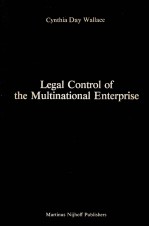图书介绍
Legal Control of the Multinational EnterprisePDF|Epub|txt|kindle电子书版本下载

- Cynthia D. Wallace 著
- 出版社: Kluwer Law International
- ISBN:9789024726684;9024726689
- 出版时间:1983
- 标注页数:387页
- 文件大小:17MB
- 文件页数:408页
- 主题词:
PDF下载
下载说明
Legal Control of the Multinational EnterprisePDF格式电子书版下载
下载的文件为RAR压缩包。需要使用解压软件进行解压得到PDF格式图书。建议使用BT下载工具Free Download Manager进行下载,简称FDM(免费,没有广告,支持多平台)。本站资源全部打包为BT种子。所以需要使用专业的BT下载软件进行下载。如BitComet qBittorrent uTorrent等BT下载工具。迅雷目前由于本站不是热门资源。不推荐使用!后期资源热门了。安装了迅雷也可以迅雷进行下载!
(文件页数 要大于 标注页数,上中下等多册电子书除外)
注意:本站所有压缩包均有解压码: 点击下载压缩包解压工具
图书目录
PART ONE:SETTING THE STAGE1
Chapter Ⅰ THE NATURE OF THE MULTINATIONAL ENTERPRISE1
1. Preliminary Observations1
2. Limiting the Scope5
3. Definitional Aspects of the MNE9
a. Definition of terms relating to the structure of the MNE9
b. Analysis of current usage10
4. Operational Aspects of the MNE13
a. Principal legal and organizational forms and structures13
b. Relation of legal form to managerial control17
5. Terminology Selection and Definition Formulation for Purposes of the Present Study19
6. Conclusion20
Chapter Ⅱ IMPORTANT PRELIMINARY DISTINCTIONS RE CONTROL AND CONTROL RELATIONSHIPS23
1. National v. International Control23
2. Internal v. External Control24
a. Distinctions: internal v. external/de facto v. de jure control24
b. Relation to international law29
c. Relevance of internal control to external legal controls32
2. ‘National Treatment’ Principle in Practice91
a. National practice92
b. EEC and international practice95
3. Application of Law and Policy99
a. Fruehauf-France100
b. ‘Serving two masters’103
c. ‘Lifting the veil’110
Chapter Ⅵ CONTROL OVER CAPITAL MOVEMENTS121
1. Host-State Laws and Policy121
2. MNE Practice126
Chapter Ⅶ CONTROL THROUGH TAX LEGISLATION127
1. Transfer Pricing127
2. Tax Treaties130
3. Relevant National Tax Laws and Policy132
4. Evaluation136
Chapter Ⅲ CONTROL THROUGH DISCLOSURE LEGISLATION139
1. Generally Applicable Host-State Disclosure Requirement140
a. National approaches140
b. Regional approaches148
c. International approaches149
2. Problem of Concurrent and Conflicting Jurisdictions154
a. National trends154
b. Regional trends169
c. International trends170
3. Evaluation174
Chapter Ⅸ CONTROL THROUGH ‘MERGER’LEGISLATION177
1. Applicability of Antitrust and the ‘Effects’Doctrine177
2. Purpose of Anti-Combines Laws183
3. American v. European Practice183
4. Model Types of MNE Mergers186
a. Merger situation Ⅰ:strict territorial principle188
b. Merger Situation Ⅱ:extension of jurisdiction through home parent to foreign affiliate189
c. Merger Situation Ⅲ:territorial principle with foreign ramifications190
d. Merger Situation Ⅳ:‘reverse extra-territoriality’191
5. Emergence of New Competition Policy and Legislation201
6. International Tentatives229
Chapter Ⅹ CONTROLS OVER OPERATIONS RESULTING IN DISINVESTMENT235
1. Voluntary v. Involuntary Disinvestment235
2. Contract Renegotiation236
a. Shift in bargaining position236
b. Econonic coercion by host state242
c. Unreasonable coercion resulting in disinvestment243
3. ‘Fade-out’ Formula244
4. Evaluation246
PAR T FOUR:TECHNIQUES OF RESTRICTIVE HOST-STATE CONTROL OVER FOREIGN MNEs:COERCED DISINVESTMENT240
Chapter ⅩⅠ EXPROPRIATION:TRADITIONAL CONCEPTS IN TRANSITION249
1. Definitions249
2. The Compensation Debate251
3. Legality Link256
4. Conclusion256
Chapter ⅩⅡ “CREEPING EXPROPRIATION”259
1. Defining the Perimeters259
2. Terminology,Interpretation and Definitions260
3. Unreasonable Interference with Ownership:“Canadianization”263
4. Unreasonable Interference with Management:“Mitbestimmung”268
a. Bundesverfassungsgericht decision:international implications271
b. German Gutachten:international implications272
5. Other Techniques of “Constructive Taking”276
6. “Constructive Taking” before National Courts and International Tribunals279
7. “Disguised Expropriation”:Barcelona Traction281
Conclusion293
PART FIVE:THE SCOPE FOR INTERNATIONAL CONTROLS295
Chapter ⅩⅢ NATURE OF INTERNATIONAL CODES AND GUIDELINES295
1. Overview of Major Current Efforts at International Codes and Guidelines295
a. The United-Nations-family ‘package’ and related efforts296
b. The OECD ‘package’298
2. Legal Aspects30
a. Non-legally-binding character30
b. Prospects for the “minimalist position”301
c. Prospects for the “maximalist position”305
d. General prospects307
3. Non-Legal Aspects308
a. Non-legally-binding nature as a possible asset308
b. Tangible non-legal effects308
4. Addressees310
a. Directives to home governments311
b. Directives to MNEs312
c. Directives to host governments315
Chapter ⅩⅣ FUNCTION OF INTERNATIONAL CODES AND GUIDELINES321
1. Protection of Beneficial Free-Flow of Private Investment Capital and Maintenance of Proper Balance of Benefits to MNE and Host Respectively321
2. Harmonization of National Laws in Certain Key Areas323
3. Coverage of Those Areas Inadequately Provided for under Municipal Law323
4. Overall Function325
Conclusion325
CONCLUSIONS327
BIBLIOGRAPHY331
TABLE OF CASES11
INDEX364